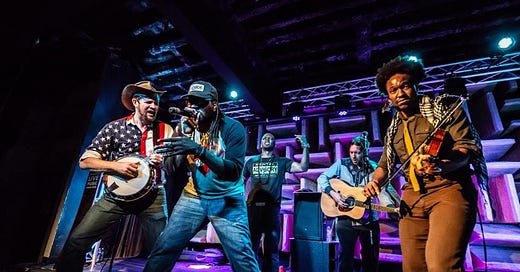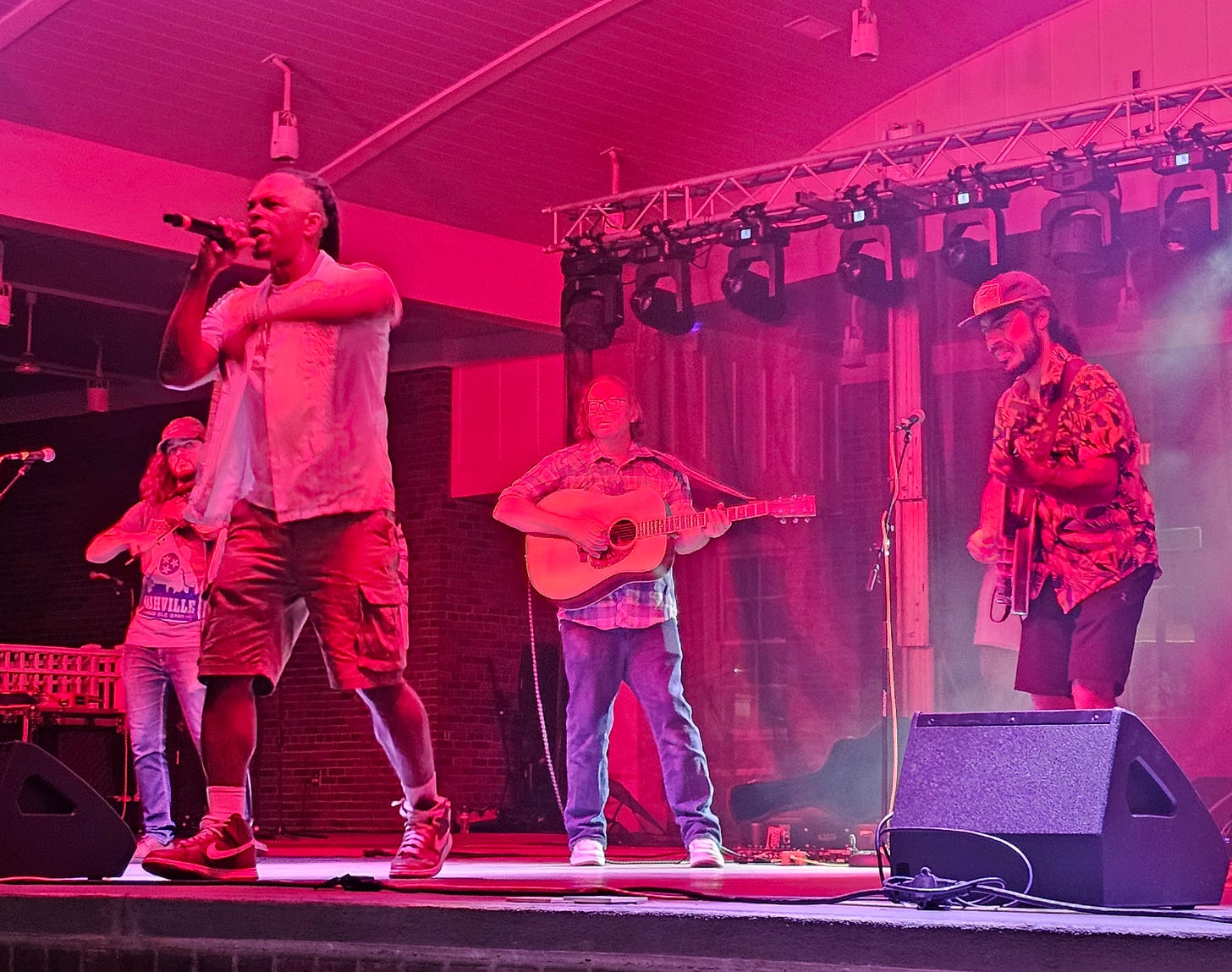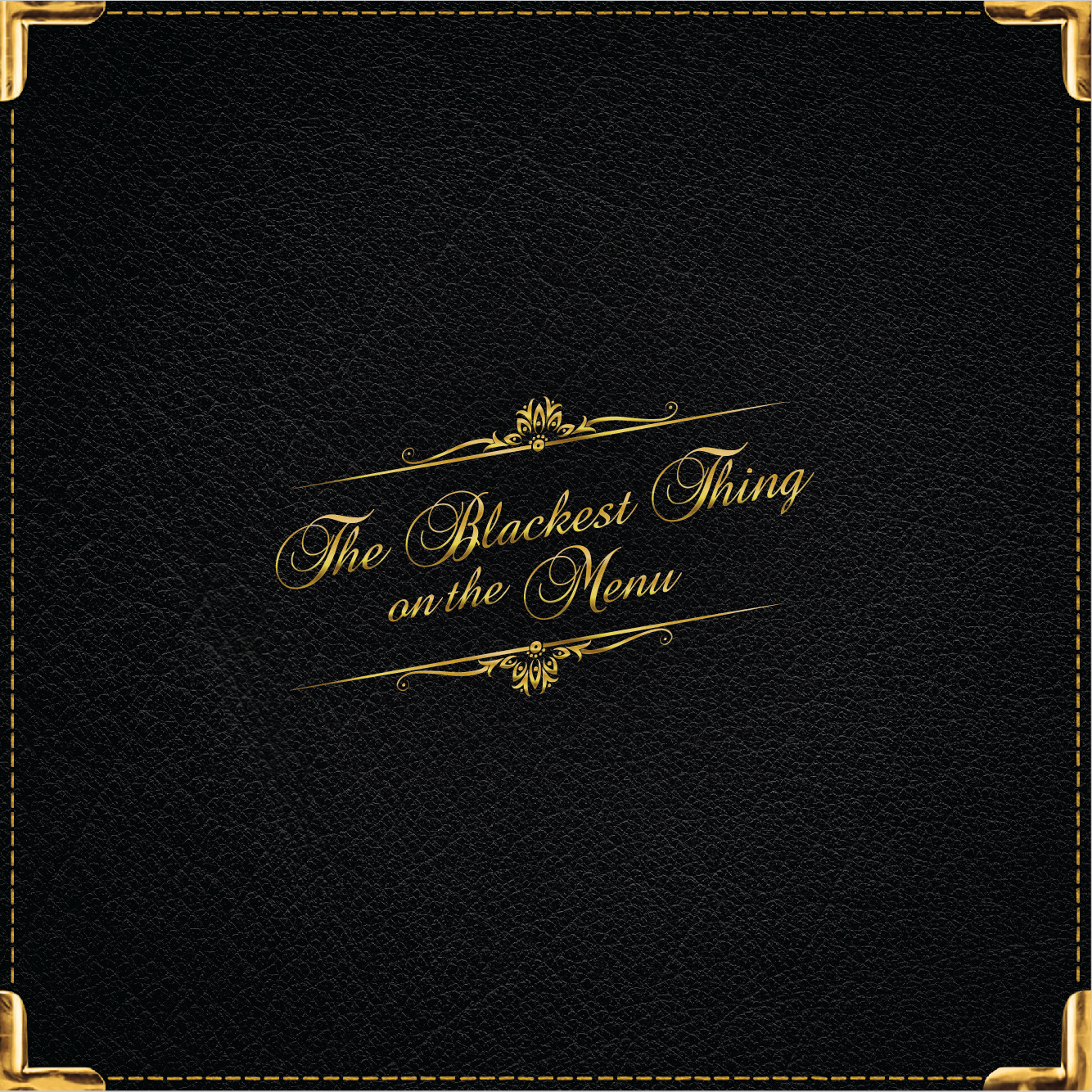What does "unity" even look like?
In troubled times, Hip Hop is a place we can look to for inspiration
Ironic, I suppose, that when I received word of the assassination attempt on former president Donald Trump, I was driving to a Gangstagrass show.
I first covered Gangstagrass in 2020, interviewing them for my podcast, Hip Hop Can Save America! The band’s vibe is a hardcore mix of Bluegrass and Hip Hop, a combination which — as I told them at the time — in theory could go very, very well, but in reality, could go very, very bad.
Turns out, the group’s members — a guitarist, a banjo player, a fiddle player, and two MCs — are all very, very good.
Their style of genre mixing — while sacrilegious to some, I’m sure — really does work, and in ways that are very different from Old Town Road, Beyoncé or Shaboozy. Discussions on the Black origins of, and influence on, many of these genres aside, there is something striking about the fierceness in which these two genres soundclash, particularly when each one is sticking very strictly to its own side of the aesthetic spectrum.
And when this brilliant multi-cultural mashup from this talented multi-racial band showers crowds that might contain fans of either genre — but almost assuredly not both — the result is something a bit… Surprising. Something emerges, something we don’t see enough of in our social, cultural, and certainly not our political landscapes these days — a spontaneous, unexpected, and almost unfamiliar feeling of…
Unity.
Now, please, I’m not naïve enough to think that bringing people that might otherwise have serious problems with one another into a concert hall for 90 minutes will somehow instantly change deep-seated biases and invoke feelings of universal peace and love and flowers and hugs…
Then again, I’m also optimistic enough to name a podcast and newsletter “Hip Hop Can Save America!” so yes, I do think Hip Hop has certain unique superpowers, among them, the ability to address, alleviate and in some cases, help eliminate some of largest societal ills — racism and inequality among them.
Regardless, I can at least get on board with the idea that, as the New York Times stated in a write-up of the band, “This Is The Music America Needs.”
Because when you do witness a Gangstagrass show in places like Gainesville, Georgia, you will see people who undoubtedly have very negative preconceived notions about Hip Hop — and let’s be honest — about those typically associated with it as well.
But I have to tell you, there will absolutely be very visible changes in those folks’ demeanors as the show goes on — at least about the juxtaposition of musical styles they are witnessing. Skepticism and denial morph into reluctant respect, sometimes into all out admiration, and in some cases, emphatic acceptance.
Hip Hop fans might not be too surprised — we’ve seen all kinds of genre-bending over the decades — but many will be surprised that it works so well, and that it doesn’t feel gimmicky.
Bluegrass fans, on the other hand, will almost definitely be feeling something warm and fuzzy about something that is totally unfamiliar to them.
Now, to be clear, I’m not suggesting all bluegrass fans are bigots, or that the ones that are will walk in hateful and magically walk out enlightened. Gangstagrass, while thoroughly enjoyable, is in no way by themselves a panacea to racism.
But we must remember that the burden is never on the oppressed or underserved to convince those who hold power or privilege to value their humanity. And I just feel like there is something there that represents an opportunity for white folks in particular to come to a realization that their implicit biases just don’t mesh with reality. And as any reformed bigot will probably tell you, there was something, at some point, that had to spark that kind of revelation.
Maybe it was love. Maybe it was a threat. Maybe an act of kindness. Maybe they just one day realized they’ve been purposefully led astray by architects of an oppressive societal hierarchy that continuously indoctrinates its own citizenry to be field soldiers in the fight to maintain a white supremacist-fueled power structure.
Or maybe it’s just the power of music.
In this case, not just any music, but Hip Hop, a powerful, culturally-driven musical force that could very easily light a spark that completely changes the course of someone’s life.
After all, Hip Hop did that for me. It did it for many of you, and for millions around the world. And it does it in ways no other musical genre or artform can.
Of course if we’re being honest, catching a Gangstagrass show might not move the more prejudiced needles at all. Sure, some folks might enjoy the performance, but with these kinds of feelings so baked in, as much as it would be nice, it won’t translate to a lick of self-realized inspiration.
This might be, in part, because of what makes this group — and this approach — so authentic. While the band is fiercely respectful of both genres, separately and when joined, they are also unapologetically antiracist in their lyrics and on-stage banter, wholly unafraid to wear their activism hearts proudly on their sleeves.
As if to say, “If you like us, great, if not, kick rocks. We’re not sugar-coating and if you feel uncomfortable, that’s on you!”
As we see with other interdisciplinary applications of Hip Hop, such as in education, in mental health therapy, as international Hip Hop diplomacy and conflict redirection (yes, that’s a thing), it is that authenticity which fosters a connection between generational, racial, economic, and sometimes even ideological divides.
That is what gives Gangstagrass — and by extension, bold, experimental applications of Hip Hop music and culture — the potential to do more than just entertain. In fact, bringing people together from disparate walks of life is indeed as much of the group’s mission as making great music, as guitarist and “mastermind” of the group, Rench, told the New York Times, “because the rise of authoritarianism and fascism really depends on people being separated.”
It’s always been said that music and sports can serve as universal unifiers, and sure, that happens here and there. For a bit. But for most folks cut from a biased cloth, simply enjoying the output of entertainers or athletes of color won’t lead to that enlightenment.
Never has.
As Black folk in particular often lament, other folk sure love the culture, but they just don’t seem to love the people.
Still, I contend that there’s no artform or movement more powerful than Hip Hop at changing hearts and minds, or at teaching new concepts, inspiring new feelings, or breaking down barriers and crossing borders.
I guess none of us can ever be fully convinced that anything can really change the hearts and minds of folks who have deep racial fear or hatred toward others — but I’m going to remain all in on the idea that within the DNA of Hip Hop there is something extraordinarily unique when it comes to being able to truly bring people together, and that when we are looking for inspiration for ways to help tackle disunity once and for all, Hip Hop is one of the best places humanity has to start.
Not with whatever generic unifying message moderate Democrats are always trying to get across. Not in the germane but uninspiring response by President Biden in the wake of the shooting. Not within the radical ideas laid out in Project 2025. Not by a former president getting shot at. Not by anything based on revenge and retribution like the overwhelming national reaction to 9/11.
If you ask me, it can only come from a movement that was literally forged by the concepts of peace, love, unity and having fun.
Gangstagrass has a new album out called “The Blackest Thing on the Menu.” Find out more about it, and them, at www.gangstagrass.com.
Thanks to Fiona Bloom for the original introduction, and recent invite.








Gangstagrass! OMG they are good. Thanks